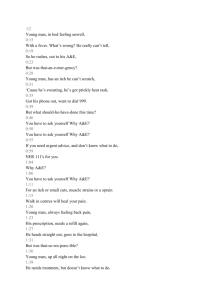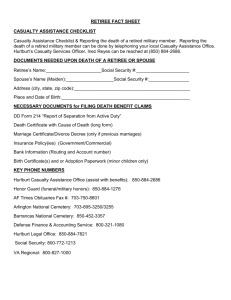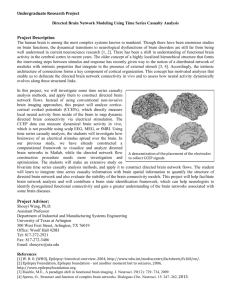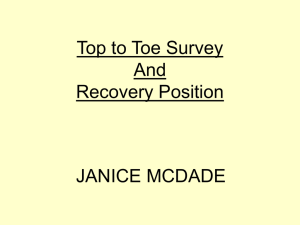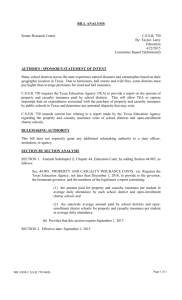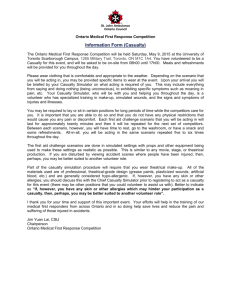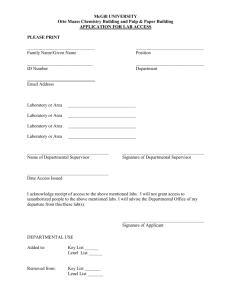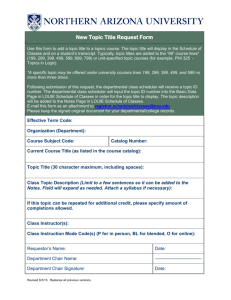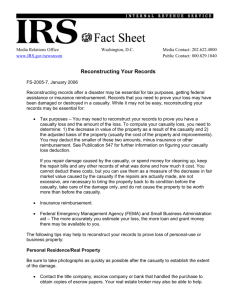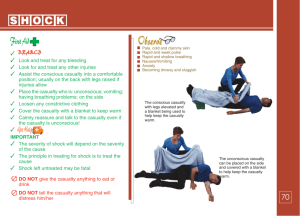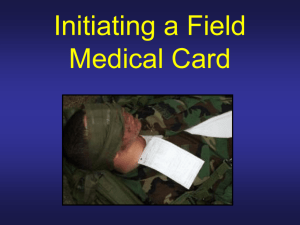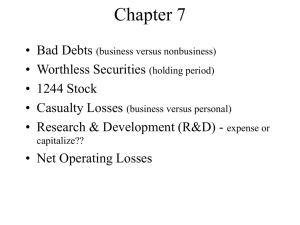AlternativeFwkSafetyCode
advertisement
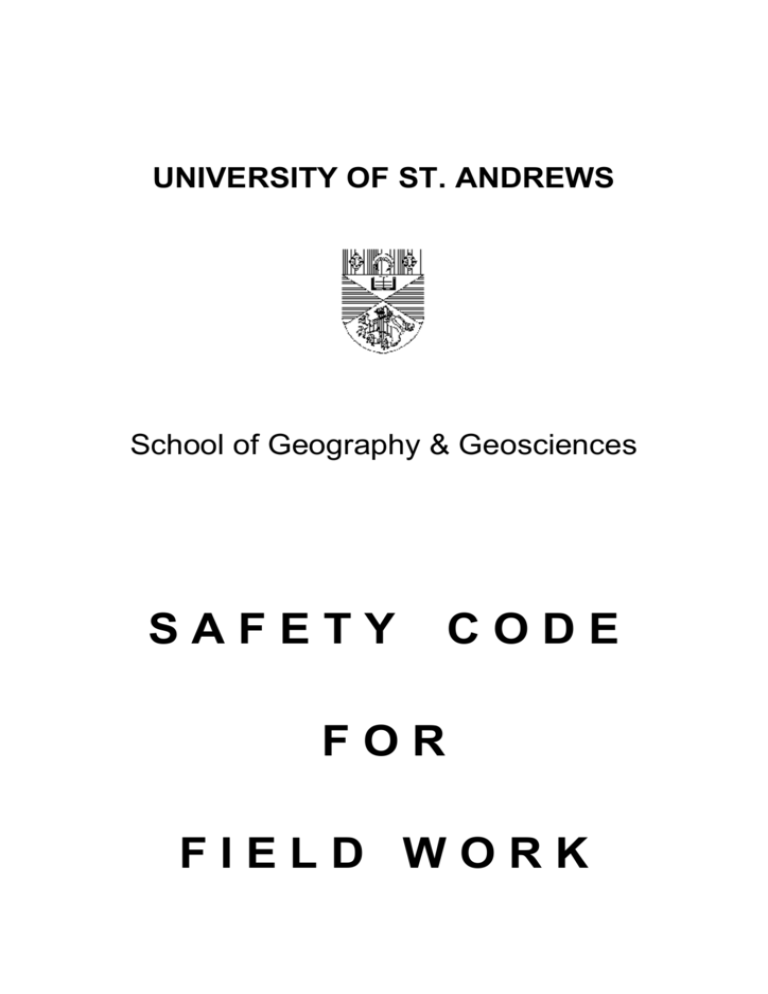
UNIVERSITY OF ST. ANDREWS School of Geography & Geosciences SAFETY CODE FOR FIELD WORK INTRODUCTION As part of the departmental safety policy statement and within the framework of the University of St. Andrews Policy Statement on Health and Safety at Work, the following is the code of conduct for field work which is carried out as a departmental activity: "As far as is reasonably practicable it is the policy of the School to ensure the health, safety and welfare of all staff and students while at work, or pursuing legitimate activities concerned with work, and to protect persons other than these persons at work against risks to health and safety arising out of or in connection with the activities, while at work, of departmental staff and students under the supervision of departmental staff" IDENTIFYING SIGNIFICANT HAZARDS All significant hazards will be identified in a risk assessment conducted before the field course. Please familiarise yourself with any special instructions, verbal or written, which may be given to you before or during field work and think before you act. It is expected that students will behave in a safe manner. RISK ASSESSMENT Every field excursion will have a Field Work Risk Assessment prepared and its content will be communicated to you, in writing, by the leaders. Each participant will be required to sign a declaration to the effect that s(he) has understood the instructions given by the leaders. For Honours students: Before embarking on dissertation field work, you must discuss it with your supervisor, prepare a report on the proposed field work, and then complete a Conditions of Work Statement form, available from the School Safety Co-ordinator. CONTROL MEASURES TO MINIMISE RISK CLOTHING In cold weather, extra layers of clothing are advisable, including waterproof overtrousers and gloves. Carry spare underwear and socks. Head Warm, waterproof wear in winter Trunk Thick wool/fibre jumper over normal shirt and underwear Waterproof - not showerproof - jacket/cagoule/macintosh which is also windproof. Ensure that lower back and waist are covered. Legs Loose fitting, heavy-duty trousers containing wool/cotton fibres. Tight jeans are not recommended. Feet Thick socks; stout boots giving ankle support. Wellington boots and trainers are not ideal for long walks. In hot sunny weather keep head and trunk covered with thin, light-coloured garments to avoid sun-stroke. For additional protection, use a high-factor sun-block lotion. PLANNING • Check weather forecasts; the higher the walk, the greater the likelihood of bad weather • Check tide times when working on the coast and choose to begin work on an outgoing tide • • • • • • • • Seek permission before entering private land and working quarries. Pay attention to local rules in quarries (blasting times, unstable rock faces) If working in remote areas, or in unfamiliar urban areas, it is advisable to have a companion. Inform someone (family, friend, landlord, hostel warden, shopkeeper) of your destination, route and estimated time of return. Try to keep to that route. Complete a Fieldwork Itinerary Card and leave it with a responsible person who can raise the alarm if you do not return Be aware that mobile phones may not function in remote areas Parties must include someone qualified in First Aid Plan to be back at base before nightfall. The return journey takes longer especially when fatigued and/or carrying heavy loads Food should include light, compact, nutritious and high calorific value items (eg. cheese, chocolate, dates, dried soup). In hot weather carry water in a polythene bottle and a source of salt If travelling overseas, check with your doctor if immunisation is required. Anti-tetanus injections are advisable, particularly if working with soil or peat Inform leaders of any medical condition which could impair your field activities GENERAL • In urban areas, beware of traffic and observe the Highway Code • Do not loiter or walk alone through socially-deprived or racially-sensitive areas • Do not antagonise the local population and respect local traditions • All social surveys must be conducted with tact and common sense; in particular, do not antagonise interviewees • Do not arrange interviews with people with whom you do not feel comfortable • Do not agree to meet strangers at times or in places that make you feel vulnerable • Always take some form of identification (letter from supervisor; ID card) when carrying out social surveys • Where possible, work in pairs while carrying out interviews • In remote areas note location of nearest telephone and emergency post/bothy • Always wear eye protection when hammering rocks or when close to others hammering. Wear hard hats at the base of cliffs, quarry faces or scree slopes. In working quarries, wearing hard hats may be mandatory • Keep rucksack loads below 14Kg (30lbs) • Do not hammer or dislodge rocks when people are below you • If you are part of a supervised group, you must immediately report any accident or illness to a group leader • Do not endanger yourself or others through abuse of drugs or alcohol • Provide leaders or colleagues with emergency contact name, address, phone number, in the event of an accident or illness • Only agree to work with colleagues you feel you can trust EMERGENCIES Learn an international Distress signal • Morse code SOS (...---...) made by radio, torch or whistle • Repeated raising and lowering of outstretched arms or branch or stick • Continuous sounding of whistle or flashing of light If a party is lost, keep together. If benighted, shelter from wind, put on all spare clothing and huddle together for warmth. If someone is injured, casualty must be kept warm, insulated from cold ground and tended by others. Casualty must not be moved, especially if internal damage is suspected, unless absolutely necessary. Administer First Aid and send for medical assistance. If a casualty has to be left behind when seeking help, remember: • Two persons, if possible, should leave to seek help • Mark position of casualty with a visible object (coloured jacket, flag) tied to a tree or a pole • Note position on map • Travel to nearest habitation for telephone and assistance Be alert to the dangers of hypothermia (severe loss of body heat) caused by cold, wet and fatigue. Symptoms may include: • Uncharacteristic behaviour; complaints of coldness and tiredness; inability to focus eyes • Muscle cramp, ashen complexion, shivering, dizziness, fainting. Death results if heat loss is not halted Emergency treatment: • Remove casualty out of wind and rain. Insulate from ground. Cover with blankets, clothes, or polythene sheets to minimise heat loss • Give sweet tepid liquid to drink. Never give alcohol, hot water bottle, hot drinks, or massage. Seek medical aid immediately if possible COUNTRY CODE When working in the field, be aware that someone owns the land. Treat private property with respect and care. • Keep to footpaths where they are provided • Leave gates as you find them • Do not drop litter or leave debris at rock exposures • Do not light (uncontrolled) fires or discard smouldering cigarettes • Do not frighten amiable livestock or unduly disturb wildlife (plant and animal) • Do not take chances with unamiable livestock Note that parts of this country are designated Sites of Special Scientific Interest (SSSI), Regionally Important Geological and Geomorphological Sites (RIGS) or Nature Reserves. In these areas, keep disruption to a minimum, and in cases of geological SSSI's, collection of samples is forbidden (ie no hammers) without permission. The local Tourist Information Office or Ranger Service can advise on the location of these sites. Please read this Code and complete the form below. If there are any aspects of this code which you do not understand you should ask before signing. Keep the Code for reference. (Please return the completed slip to your Course Co-ordinator or excursion leader) ...........................................................Cut here............................................................ I have read and understood the Safety Code for Field Work, and agree to abide by its recommendations. NAME (Block Capitals): SIGNATURE: DATE:
